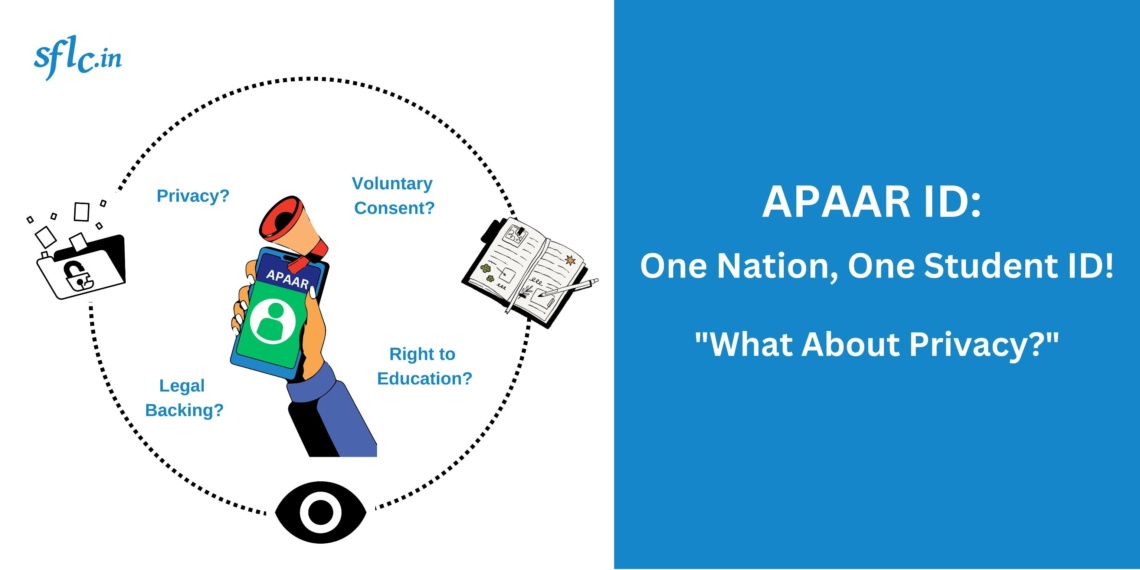Background:
The acronym APAAR has been making the rounds since October 2023 in the news and academic circles and civil society organizations. APAAR stands for Automated Permanent Academic Account Registry, a lifelong ID system for students in India, as news media reported. APAAR was reportedly first discussed at the Akhil Bharatiya Shiksha Samagam in July 2023, a conclave that also celebrated the 3rd anniversary of the National Education Policy, 2020.
On 11th October 2023, the Secretary of the Ministry of Education addressed a letter to the Chief Secretaries of the States and UTs informing them that in order to achieve the objective of “One Nation, One Student ID” and to make students global leaders on the lines of NEP 2020, one APAAR ID of the students will be created which would be lifelong. The letter further noted that APAAR would be based on the AADHAAR numbers of each student, and the parents’ separate consent would be obtained through the consent form that MoE shared with the letter. The letter also noted that data collected through Aadhaar would be masked and kept confidential. The letter requested the chief secretaries to direct the schools to conduct parent-teacher meetings to get the parents’ consent.
APAAR was finally launched by the Union Minister, MoE, on 13th February 2024 as Digital Public Infrastructure at a national conference on APAAR. The Minister also informed that 25 crore students have already been enrolled in the system, and this ID would be a global and aspirational document for Indian students.
APAAR sans legal backing:
APAAR has no legal or statutory backing, and the creation of the ID is loosely based on the letter issued by the Secretary of MoE. In the absence of legal sanction, it is worrisome to see that schools are being directed to enroll students en mass after obtaining their parents’ consent. In response to an RTI application filed by the Internet Freedom Foundation on the legality of APAAR, the Ministry of Electronics and Information Technology informed that it is the MoE that will inform about the Standard Operating Procedure and policy for creating/verifying the APAAR IDs. The MeitY informed that it is the implementing body and has developed the portal and follows DPDP Act. The Supreme Court of India in K.S. Puttaswamy (Privacy-9J.) v. Union of India, (2017) 10 SCC 1 had held that there must be a law in existence to justify an encroachment on privacy, and the existence of a law is an essential requirement. APAAR ID, so far, is not backed or supported by any law. It is also evident from the response of MeitY that even the MoE has not developed any policy in furtherance of its objectives of creating the APAAR IDs.
Concerns surrounding privacy:
As per several reports, the parents of the children have expressed concerns over the privacy aspects of the programme and its linking with the Aadhaar. They fear that their Aadhaar data may be shared with third parties or may be leaked too. The processing will be halted once the consent is withdrawn, per the consent form provided. However, the data, once processed, shall not be affected after the consent is withdrawn. The consent form is silent as to whether the same shall be erased from the database. The DPDPA 2023, under Section 12, confers the right to correct and erase personal data by the data principal for the processing of the data for which consent was previously given.
Notably, MeitY claims to have followed the Data Protection Act, but it has completely disregarded this particular right of the data principal. The consent form is in violation of the provisions of the DPDP Act 2023. The APAAR ID, which is based on the Aadhaar number will not be able to meet the legality prong of the test propounded by the Supreme Court of India in K.S. Puttaswamy (Privacy-9J.). The ID, implied to be voluntary, would be treated as compulsory. Education, a constitutional right in India, shall be contingent upon APAAR ID. The Hon’ble Supreme Court in K.S. Puttaswamy (Aadhaar) Judgement held that education in India is neither a benefit nor a service. The Court ruled that Aadhaar can not be made mandatory for education. However, the government seems to have taken a bypass to bring Aadhaar again through APAAR ID.
Reminder: APAAR ID is Voluntary, Not Mandatory!
Is your educational institution insisting that you or your child must create an APAAR ID?
PS – SFLC.in received a response to its RTI application dated 16.12.2024 on the use of APAAR ID by the Ministry of Education. The MoE clarified that APAAR ID is not mandatory for any child in any kind of school and no adverse consequences will arise for students [whose parents] do not provide consent for APAAR ID. It is being created only with the consent of the parent or guardian.
Further, MoE stated that no data other than what is available in UDISE+ is being collected or stored for purposes of APAAR. However, to create an APAAR ID, Aadhaar is the only requirement with no exception. APAAR is being operationalised under the Department of School Education and Literacy (DoSEL), Ministry of Education, which is authorised to use Aadhaar authentication under Section 4(4)(b)(ii) of Aadhaar Act, 2016 read with Rule 5 of Aadhaar Authentication Good Governance Rules, 2020. SFLC.in is concerned with the widespread practice of schools mandatorily enrolling students with APAAR ID, in absence of procuring verifiable and meaningful consent from the parents or guardians.
To help you address this issue, we’ve created a template letter that you can use to raise your concerns with your respective educational institution. Click below to access the template and protect your rights!
SFLC.in_APAAR ID Letter Template DOCX
SFLC.in_APAAR ID Letter Template_ODT




